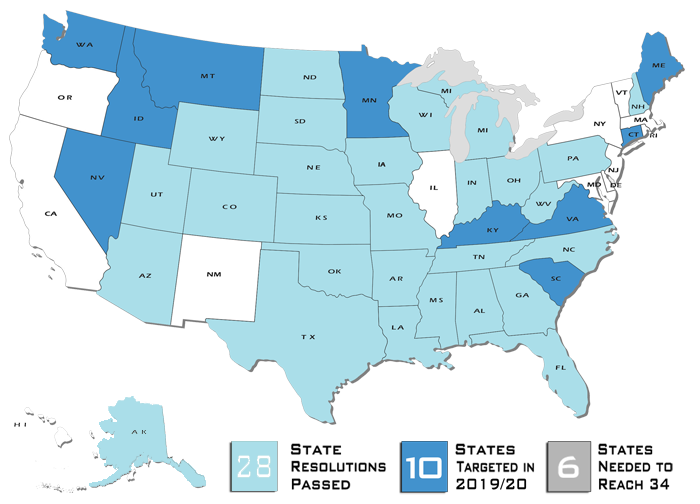The Volokh Conspiracy
Mostly law professors | Sometimes contrarian | Often libertarian | Always independent
The ratification of the Equal Rights Amendment could lead to an Article V Convention for Proposing Amendments
If states cannot rescind their ratification proposals, then 2/3 of the states may have already voted to call an Article V Convention for the Balanced Budget Amendment
Currently, the courts are considering whether the Equal Rights Amendment has been ratified. These cases turn on two important questions. First, has the deadline passed to ratify the amendment? Recently, Justice Ginsburg suggested that the ratification deadline-- which appears in the resolution, not in the text of the amendment--has indeed passed. The Office of Legal Counsel agreed with this position.
There is a second question that OLC did not opine on: should the five states that voted to rescind their ratification count towards the required 3/4 majority (38 states). In litigation, Virginia has argued that states cannot rescind their ratifications of the Equal Rights Amendment. If Virginia is correct, and ratifications cannot be rescinded, then we may be standing on the precipice of an Article V convention for proposing amendments.
According to the Balanced Budget Amendment task force, 28 states have passed resolutions calling for an Article V convention to propose a balanced budget amendment.
However, several states that voted to call for the convention subsequently repealed their resolutions. I cannot pin down a precise number here. According to the progressive Center on Budget and Policy Priorities, eight states have repealed their ratifications. The group lists Delaware, New Mexico, Maryland, and Nevada as states that recently rescinded. The group also lists Oregon, Idaho, Virginia, and South Carolina as other states that rescinded in the past. (Yes, Virginia has voted to rescind an amendment; this decision creates some tension with the Commonwealth's current litigation position.) The Center also states that they are working to rescind ratification in two more states: Colorado and New Hampshire.
Under Virginia's theory, the rescissions are not valid. As a result, we would have (by my count) 36 states that have voted to call for a convention--two more than the requisite 34 states. If Virginia is correct, then Congress is required to call a new convention to consider the Balanced Budget Amendment.
My numbers here are tentative, because some of these states approved resolutions that were worded slightly differently. I will leave to others the difficult question of how to interpret the requirements of Article V.
Rob Natelson recently wrote a book on the topic. Natelson writes that states can rescind their ratification applications:
Some have argued that states cannot rescind applications, and that once adopted an application continues in effect forever, unless a convention is called. In part, this is based on judicial deference to congressional suggestions that a ratification cannot be rescinded. However, the position that applications cannot be rescinded is contrary to the principles of agency the Founders incorporated into the process. An application is a deputation from the state legislature to Congress to call a convention. Just as one may withdraw authority from an agent before the interest of a third party vests, so may the state legislature withdraw authority from Congress before the two-thirds threshold is reached.
This theoretical conclusion is consistent with traditional multi-government convention practice. The power of a state to rescind its resolutions, offers, and ratifications was well-established by the time Article V was adopted, ending only when the culmination of a joint process was reached. The historical record contains specific examples of rescission of convention applications and calls.
Natelson has also put together an Article V handbook.
Update: In my prior post, I used the phrase "constitutional convention." Natelson wrote, and reminded me that the Constitution uses a different term: a "convention for proposing amendments." I'll try to be consistent with this usage. Moreover, the phrase "constitutional convention" conveys the image of starting from scratch with a brand new document.



Show Comments (52)